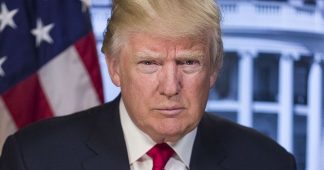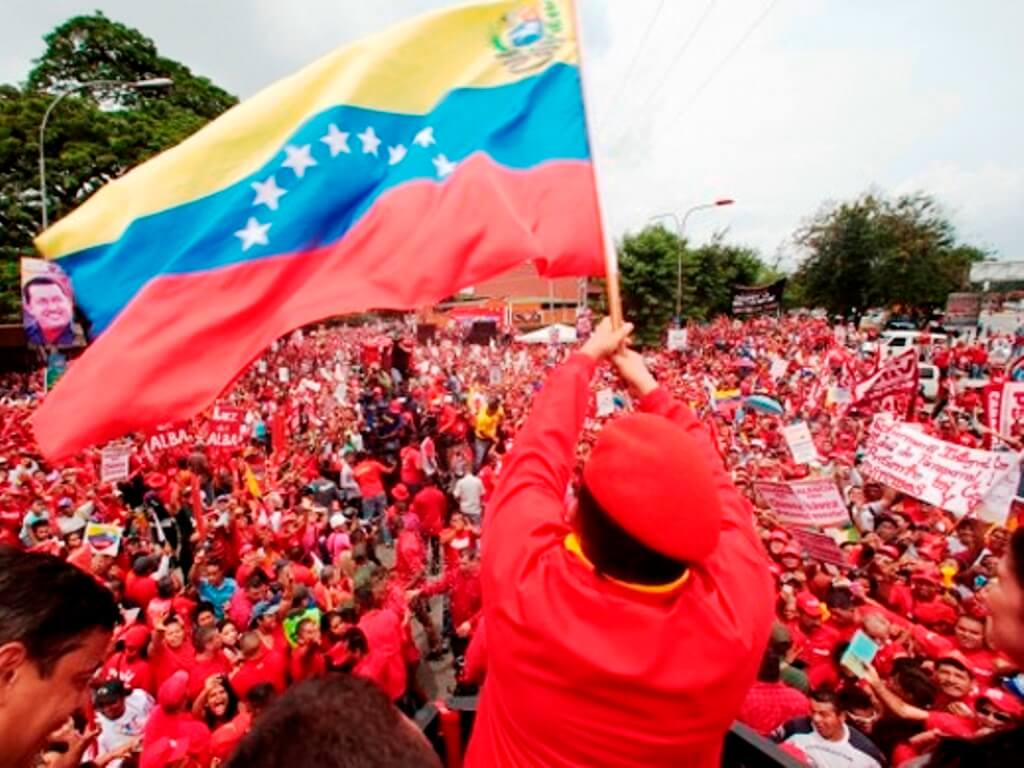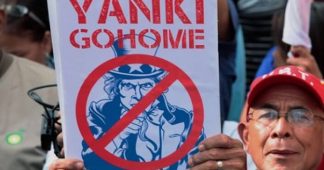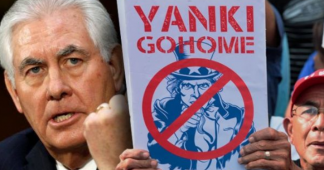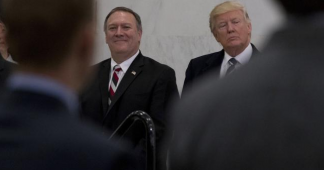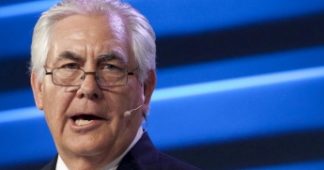Donald Trump has warned that Washington is considering a “military option” in Venezuela. This follows Trump’s earlier threat to expand Obama-era sanctions against Venezuela if it creates a new “Constituent Assembly” as supported by President Maduro.
When the election for the new body was held, Reuters reports, U.S. Ambassador to the U.N., Nikki Haley, called the results a “sham” and a “step toward dictatorship.”
The U.S. military reported in April that “The growing humanitarian crisis in Venezuela could eventually compel a regional response.”
Now the New York Times reports that Trump refused to take a phone call from the Venezuelan government over the military threat, with a White House spokesperson explaining, “President Trump will gladly speak with the leader of Venezuela as soon as democracy is restored in that country.”
The administration, which many newspapers feared would be “isolationist” and neglect the American empire, has taken the baton from Obama with vigor on this front. The Trump administration’s stance is not only a more belligerent version of Obama’s, but it is not a million miles away from that of the U.S. press reporting on Venezuela.
From these newspapers, we have had headlines like, “Venezuela’s Maduro decried as a ‘dictator’ after Congress annulled,” and “Venezuela burns as dictator Maduro turns his back on the people,” while the New York Times editorializes about Maduro’s “drive to dictatorship.”
This follows almost three years of escalating demonization of the Venezuelan government in the international media.
The New York Times has spoken of “the kind of economic collapse countries rarely see outside a war.” The BBC predicted a humanitarian crisis. The time was “ripe for US to address Venezuela’s mess” according to the Christian Science Monitor last year.
The majority of the media loathes Trump. But there is little likelihood of their opposing him if he follows through on his military threat.
This represents a step-change in anti-Venezuelan rhetoric. The argument now is that Venezuela has become a dictatorship. Previously, the argument was that it was already a dictatorship.
Back in 2015, as the country headed to elections, the Atlantic called Venezuela “A Dictatorship Masquerading as a Democracy.”
The dictatorship charges go back to the very beginning when Hugo Chavez was elected with 56 percent of the vote in 1998. In 1999, the BBC ran an article by an oppositionist describing “Venezuela’s dictatorship” and claiming “Hitler was elected too.”
When Chavez was briefly overthrown in a coup in 2002, the New York Times celebrated, “With yesterday’s resignation of President Hugo Chavez, Venezuelan democracy is no longer threatened by a would-be dictator. Mr. Chavez, a ruinous demagogue, stepped down after the military intervened and handed power to a respected business leader, Pedro Carmona.”
The media’s line then was consistent with that of the Bush administration, which denied that a coup had taken place. But the U.S. knew it was a coup and was involved. State Department’s Office of Inspector General, reports Mark Weisbrot, acknowledged the role of the NED, the Pentagon and other government bodies in supporting, “individuals and organizations understood to be actively involved in the brief ouster of the Chavez government.”
Nor did it cease after the coup failed. U.S. State Department cables released through WikiLeaks suggest that USAID, a major instrument of American “soft power” was involved in supporting opposition boycotts and protests.
Chavez’s return to power meant the restoration of democracy. The Venezuelan government continued to be elected in fair and free elections – “the best in the world” according to former US president Jimmy Carter, a “model democracy” according to international observers. But the dictatorship smears continued.
When Chavez died, Deutsche Welle characterized him as a “dictator with influence.” CNN gave David Frum a column to say that Chavez was an “authoritarian” whose “regime” “systematically controls and manipulates the mass media” – ignoring the fact that most of the mass media was in private hands and hostile to Chavez.
Now that the goal is to overthrow Maduro, the story has modified. Venezuela wasn’t quite a dictatorship or a tyranny beforehand, but now it is!
What lies behind this? In a previous media review, we described the crisis that has befallen the Venezuelan economy beginning in 2014. Collapsing oil revenues amid a commodities price slump, and problems with the variable exchange rate mechanism created an inflation-depreciation spiral.
Many of the resulting problems were being overstated by a hostile global media. As Gabriel Hetland put it in the Nation, “Venezuela is in the midst of a severe crisis … mainstream media have consistently misrepresented and significantly exaggerated the severity of the crisis.”
Natalia Viana, co-director of Agencia Publica, agrees, writing for the Huffington Post that about Venezuela is drowning in “fake news.”
While she criticizes the “exaggeration and selective information” coming from state media, she also says, “Forget the majority of what you read out there: Venezuela is not experiencing a “humanitarian catastrophe” due to a general lack of food, though there is a shortage of some basic goods; the Maduro government will not fall tomorrow as the opposition hopes; and though violence from the national police has certainly led to deaths, my reporting on the ground indicates that it is not as many as some have claimed.”
This doesn’t mean the political crisis hasn’t got much worse. The critical recent turning point was Maduro’s decision to call for a vote on a new Constituent Assembly, which would rewrite the constitution and take over for two years.
Opposition members and the international media alleged that the vote was fraudulent. So did the company that provided the machines for the votes, which according to the New York Times said that the 8 million total votes estimated by the National Electoral Council was at least a million out.
There are also controversies about the process. Gabriel Hetland says “the CNE did not follow the procedures typically used to guarantee the vote’s accuracy,” adding that “this is the first time that a CNE rector has invalidated an election result outright.”
The government, for its part, claimed that opposition activists had attacked 200 polling stations during the vote, in an attempt to suppress turnout.
As Greg Grandin points out in the Nation, this is not the first time Venezuela has been in such a grave crisis. Citing reports of soaring poverty, rising authoritarianism, the growth of political imprisonment, extrajudicial executions, and frequent riots, Grandin says it wasn’t “obsessively covered in the United States” because “it was from 1996, two years before Hugo Chávez was elected president, when the country was governed by a Washington ally.”
The scale of opposition violence in this situation is often blandly overlooked in anglophone reporting. For example, the wire service Associated Press reported the looting of the city of Maracay and the attacks on government offices in late June, but this was barely taken up in the press. Likewise, Reuters showed footage of an opposition bombing in Caracas on 11th July, while Venezuelan media footage showed the supreme court set on fire two days later, but little of this appeared in the news.
The subsequent spectacular attack on the supreme court building by a retired security officer, Oscar Perez, using a helicopter, was more widely reported – but often in a weirdly admiring way, with Perez described repeatedly as “Venezuela’s James Bond,” referencing his occasional acting roles. Less prominently mentioned was his connection to a former interior minister, Miguel Rodríguez Torres, sacked by Maduro after he was blamed for a number of deaths during the major 2014 clashes – including the killings of Chavistas.
Reuters accuses the government of having “tarred opponents as intent on retaking power by force.” And yet, opposition leaders regularly give speeches lauding the 2002 coup, regretting only that it did not succeed in overthrowing Chavez.
The media also tends to glamorize opposition leaders close to the most violent sectors of the Venezuelan opposition, such as Leopoldo Lopez, celebrated as a “political prisoner” by the New York Times, and championed by U.S. Vice President Mike Pence and former Spanish PM, Jose Zapatero.
Lopez has close ties to the 2002 coup leaders, documented in impressive detail by Roberto Lovato at [Foreign Policy*], and gives speeches lauding the same coup. While some opposition leaders like Henry Capriles would probably prefer some sort of negotiated settlement, it is the glamorous Lopez and his wife Lilian Tintori – credited with “Gandhi-style civil disobedience” despite their role in the 2014 violence – who have been internationally feted.
On the other side, some of Chavismo’s international supporters are critical of the government, and corrupt elites linked to the state. Noam Chomsky, speaking to Democracy Now describes “corruption” and “robbery” in Venezuela “especially after Hugo Chavez’s death,” suggesting that for all the achievements of the Bolivarian Revolution and its counterparts, it depended too much on a “rise in commodity prices, which is a temporary phenomenon.” But unlike the U.S. media, they aren’t cheerleading an undemocratic opposition.
George Ciccariello-Maher, writing for Jacobin, argued that the “corruption, bureaucracy, and the complacency of new elites” present a problem. However, he adds that since the opposition won a majority in the National Assembly there has been “a full-blown institutional crisis in which the opposition has sought to stoke crisis, destabilize the government, and to make the country ungovernable.”
Gabriel Hetland agrees, lamenting the lack of attention to “vile opposition actions” including “the burning alive of a number of Black and brown citizens who ‘look’ Chavista.”
“It is far from clear,” he adds, “that Venezuela’s popular sectors would fare any better under an opposition-led government.”
Of course, they do not appear in the major international media, who aren’t interested in fulfilling the promise of social justice and participatory democracy. The media want a U.S. intervention, supporting the right-wing of the opposition, despite its violently anti-democratic record.
And as much as they hate Trump, if he offers it to them, they’ll have a hard time turning down any option, military or otherwise, in Venezuela.
*Editor’s note: The original article at teleSUR cited Roberto Lovato as publishing with Venezuelanalysis. His piece was actually from Foreign Policy. The VA team slightly edited this article to reflect this.
